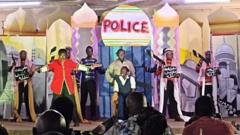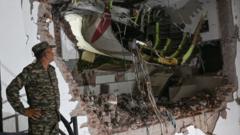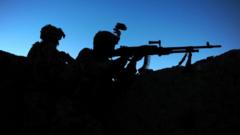Police action amid the drama festival in Nakuru has brought rising tensions to a head, as students advocate for their detained author and demand the right to perform their play that critiques leadership and governance.
Tensions Erupt in Kenya's High School Drama Competition as Tear Gas is Deployed

Tensions Erupt in Kenya's High School Drama Competition as Tear Gas is Deployed
Tear gas was used by police in Kenya to disperse crowds during a controversial high school drama competition that sparked protests and raised questions about freedom of expression.
In a shocking turn of events, the national high school drama competition in Kenya became enveloped in chaos on Thursday morning when police deployed tear gas to disperse a crowd eager to watch a contentious play titled "Echoes of War." The play starkly reflects the disillusionment among the youth in a fictional kingdom, mirroring the dissent seen in recent protests against tax increases.
The play's scriptwriter, Cleophas Malala—a former senator—was detained, leading students from Butere Girls School to protest for his release. Despite an earlier disqualification from the competition, a High Court ruling reinstated the play's participation, yet the atmosphere was charged as the police moved aggressively to manage the crowd.
Students rallied in protest when Malala was prevented from meeting them for final rehearsals, and upon receiving news of his detention, they song the national anthem as a gesture of solidarity. One student expressed dismay at the situation, questioning, "There's no audience. Who are we performing for?" This sentiment echoes their frustration against police intimidation.
In the aftermath, Education Minister Julius Ogamba criticized Malala's involvement, suggesting that the competition should remain devoid of political influence, while Interior Minister Kipchumba Murkomen emphasized the need for a separation between politics and education. These comments sparked further debate about the role of politicians in the educational sphere.
Amnesty International condemned the incident as indicative of state suppression of free expression, while Chief Justice Martha Koome warned that Malala's detention violated court orders and undermined the rule of law. Prominent figures such as Kalonzo Musyoka voiced opposition to the police's actions near students, calling the girls' refusal to perform a courageous act.
As emotions run high, opposition groups are pushing for the students to be allowed to present their work, calling for respect of free speech and artistic expression in Kenya's educational institutions.
The play's scriptwriter, Cleophas Malala—a former senator—was detained, leading students from Butere Girls School to protest for his release. Despite an earlier disqualification from the competition, a High Court ruling reinstated the play's participation, yet the atmosphere was charged as the police moved aggressively to manage the crowd.
Students rallied in protest when Malala was prevented from meeting them for final rehearsals, and upon receiving news of his detention, they song the national anthem as a gesture of solidarity. One student expressed dismay at the situation, questioning, "There's no audience. Who are we performing for?" This sentiment echoes their frustration against police intimidation.
In the aftermath, Education Minister Julius Ogamba criticized Malala's involvement, suggesting that the competition should remain devoid of political influence, while Interior Minister Kipchumba Murkomen emphasized the need for a separation between politics and education. These comments sparked further debate about the role of politicians in the educational sphere.
Amnesty International condemned the incident as indicative of state suppression of free expression, while Chief Justice Martha Koome warned that Malala's detention violated court orders and undermined the rule of law. Prominent figures such as Kalonzo Musyoka voiced opposition to the police's actions near students, calling the girls' refusal to perform a courageous act.
As emotions run high, opposition groups are pushing for the students to be allowed to present their work, calling for respect of free speech and artistic expression in Kenya's educational institutions.





















